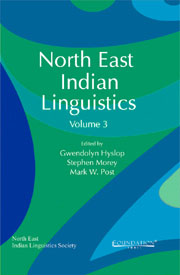Book contents
- Frontmatter
- Contents
- About the Contributors
- Foreword
- A Note from the Editors
- The View from Manipur
- The Sal Group
- 3 Three Meanings of “Language” and “Dialect” in North East India
- 4 An Initial Reconstruction of the Proto-Bodo-Garo Noun Phrase
- 5 Nocte and Jingphaw: Morphological Correspondences
- 6 Tangsa Agreement Markers
- Tibeto-Burman Nominalization
- Tani
- Eastern Indo-Aryan
- Austroasiatic
6 - Tangsa Agreement Markers
from The Sal Group
Published online by Cambridge University Press: 26 October 2011
- Frontmatter
- Contents
- About the Contributors
- Foreword
- A Note from the Editors
- The View from Manipur
- The Sal Group
- 3 Three Meanings of “Language” and “Dialect” in North East India
- 4 An Initial Reconstruction of the Proto-Bodo-Garo Noun Phrase
- 5 Nocte and Jingphaw: Morphological Correspondences
- 6 Tangsa Agreement Markers
- Tibeto-Burman Nominalization
- Tani
- Eastern Indo-Aryan
- Austroasiatic
Summary
Introduction
In all of the various linguistic varieties that are grouped under the heading Tangsa, verb complexes are marked by portmanteau morphemes that convey information about person, and tense/aspect or polarity. Consider (1), an example from Cholim Tangsa. Here the reciprocal verb răbom ‘say’ is marked by the 2nd person plural past marker, king. As we will see below in §2 (Table 4), -ing is the marker of 2nd person plural and k- is present on all 1st and 2nd person past forms.
The function of these markers is similar to the ‘sentence final words’ in Jinghpaw and Nocte as discussed by DeLancey (this volume), though much simpler than the system described for Jinghpaw (Jinghpo) in China by Dai (1992), briefly reprised in Dai and Diehl (2003).
We will term these ‘agreement markers’ because they carry person agreement with at least one of the arguments of the verb. In the Cholim and Lochhang varieties (§2 and §3), this agreement is only with the actor, whereas in Moklum, as reported by Das Gupta (1980), and briefly discussed in §5, there is hierarchical marking, in other words 1st and 2nd person undergoers are marked together with the actor in at least some situations. This difference of structure between Cholim and Lochhang on one hand and Moklum on the other has implications for the subgrouping of Tangsa varieties. Although much more data needs to be collected, particularly on Moklum, it would appear that Moklum should be treated as belonging to a different subgroup within Tangsa.
- Type
- Chapter
- Information
- North East Indian Linguistics , pp. 76 - 101Publisher: Foundation BooksPrint publication year: 2011
- 2
- Cited by



